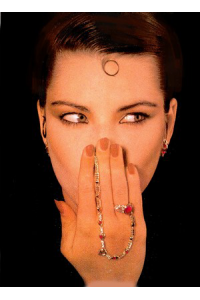PRINT
Casey goes to Italy to escape her grief, but instead she finds herself falling in love.
An offer to study art in Italy seems the perfect opportunity for Casey to recover from her husband’s tragic death. She doesn’t mean to fall in love, but then she meets Alessandro, a wealthy and charming Italian soccer sensation, and sparks fly.
However, Alessandro’s fans are against her, and life with a celebrity turns into a nightmare. Worse still, photographers stalk them during even their most intimate moments. Alessandro is vibrant, intellectual and desperately sexy. When they’re together, everything is perfect, but Casey wants a quiet life. Alessandro is a star and his fans are many…and vocal.
Will these two different people be able to save a romance they both need but never thought they would find?
Publisher's Note: This book was previously released elsewhere. It has been revised and reedited for release with Totally Bound Publishing.
General Release Date: 14th April 2020
The phone rang in the tiny apartment on the third floor. Casey answered it, pushing the shutters open to let in the early morning sun.
“Hello, is this Casey?”
“Yes? Who’s calling?” Casey gazed at the sunrise over the tiled roofs of Torino.
“It’s me, your ex-tyrannical boss Greta.”
Casey chuckled. “You stopped being my boss when I moved to Italy, but you’re still a tyrant, I’m sure. Why are you calling me in the middle of the night?” Casey checked her watch. “It must be one a.m. in Ohio.”
“I’m up checking the latest edition before it goes to the printers tomorrow and I’d rather call from the office than on my home phone.”
“Is anything wrong?” Casey felt a little twinge of disquiet. “Everything’s all right back home, isn’t it?” She paced as she spoke, walking from the bedroom to the living room.
“Of course, honey. Don’t worry. Listen, I have a favor to ask you. I need an interview with a soccer star. I’ve set it up for you. Everything is okay. The guy said he’d meet you, no problem.”
Casey stopped in the middle of the living room and frowned. “What do you mean soccer? I don’t know a thing about the sport. Can’t you send Scott to do the interview? He loves sports. I’d sound like an idiot. I don’t have the first idea what kind of questions to ask!”
“This is a woman’s magazine. We don’t want a man’s point of view.” Greta’s sigh sounded loud over the phone. “You’re in Italy. You can hop on a bus and be in front of the stadium in half an hour. Another journalist would have to take an airplane, get over her jet lag, check into a hotel and cost the magazine a fortune. You know we’re on a budget, Casey. So…please? For a former boss in need of an article about a handsome Italian football star?”
“I thought you said soccer?” Casey resumed pacing. She wanted to help Greta—after all, Greta had been there when she needed her and, besides being her ex-boss, she was an old friend—but she’d never done an interview. She’d make a complete mess of it.
“They call it football everywhere else in the world. We Americans are the only ones who call it soccer. There’s a good question for you, ‘What do you think about the word soccer?’ You’ll do just fine.”
Casey leaned against the window. “Greta, I’m in Italy to study art. And to learn, eventually, how to speak perfect Italian. I am not here to make a fool of myself posing as a journalist.”
“You still have your badge, don’t you?”
“Well, you gave me one,” Casey said. “After all, I did work for the magazine.”
“You do have your badge, good. I knew you’d keep it. You just loved to wave that little badge around and get—”
“All right, you win. For old times’ sake then. Email me all the details and let’s get it over with.”
“Thank you, honey. You’ll get paid top rates, don’t worry about that.”
“I should hope so. Now hang up, email me and don’t forget to spell the names and addresses right or I’ll interview an Italian street cleaner and send you that instead. I’ll make up a bunch of lies and you’ll get sued.”
Greta laughed. “Threats, that’s what I get? I go out of my way to find you a job and that’s all you can say?”
“I appreciate it. Besides, my art classes don’t start until September.” Casey pressed her hand against the windowpane. The sun had warmed it. She pulled back and turned away.
Greta’s voice was sympathetic. “I’m sure you made the right decision, honey. And, you know, if you wanted to send us articles about your new life, we’d print them. You could write about your neighborhood, the schools, the food and the traditions. I think our readers would like that, we could call it, ‘An American in Torino, My Story’, what do you think?”
“I think I’ll wait for your email. Bye, Greta. It was good hearing from you. I’ll keep in touch.”
Casey put the phone back in its cradle and walked over to the window in her bedroom. The sun bathed the room in its milky light. It was early. Tucked in the eaves, the pigeons were still sleeping. She shrugged out of her bathrobe and stood naked for a moment in a patch of sunlight. Humming, she went into the bathroom and took a shower. Once dressed in jeans and a T-shirt, she put her damp hair into a chignon and wandered back to the window.
It was late August in Italy and most people were at the coast for their vacation. The city was almost empty—there wasn’t the usual hubbub of rushing cars and horn-beeping taxis rattling through the cobblestone streets around the plaza where Casey rented a small, one-bedroom apartment.
Now the pigeons were starting to coo in the eaves. There was the faint sound of a train leaving the station, and a woman down on the street was sweeping her stoop.
Casey leaned against the windowsill and stared out at the scene. Torino was renowned for its beauty and splendid architecture and it boasted many famous churches, parks and museums. Torino wasn’t one of the quaint Italian cities with the red-tiled roofs and medieval houses. It was a magnificent city, built on the site of an ancient fortified castle on a plateau surrounded by the Piedmont Mountains. The remains of the castle and the outline of the walls were still visible, but the city had grown and sprawled around it, hiding the old outline and blurring it, so that you’d never believe kings and armored knights had once ridden along the banks of the wide Po River.
Casey hummed as she put coffee into the percolator and cut bananas onto a plate. She’d go get some pastries too, fresh from the bakery just across the street where she bought bread, croissants and the crispy, buttery, almond biscuits she adored. Then she would watch TV, trying to understand the staccato Italian.
Her phone buzzed, startling her. Before she read Greta’s email, she wiped her hands on the dish towel and poured herself a cup of fresh coffee. Then she sat on her couch. The email gave her a name, the time of the interview, the address and a few sample questions. The magazine had been bombarded with letters ever since it had covered the World Cup in Paris. Most of the letters had to do with the Italian soccer team and Casey was amused to see that Greta had included a few letters in the email.
Dear Watch Out! I really enjoyed your articles about the World Cup, and the photos of the players. Who’d have thought soccer babes were so cute? I’m looking forward to seeing more stuff on soccer, especially about the Italian team! Where do they usually play? Where can we see them?
Dear Watch Out! I love soccer! I play on our school team, on our county team and on our club team. I want to become a pro and would appreciate some tips. Is it true that in Europe women don’t play soccer?
Dear Watch Out! Please don’t let the World Cup finals spell the end of soccer in your magazine. I think your sports section should give equal space to all sports, not just the American ones. What about articles on individuals? We know how the American sports superstar lives—how does the rest of the world treat their stars?
Casey jotted down a few ideas then checked the date again and swore—it was for that afternoon. Damn! And the name—A. Salamander, but that couldn’t be right, could it? She ran her hand through her hair and muttered under her breath, then she put on her shoes and went to get her almond pastries.
In the panificio, the baker greeted her by name, a wide smile on his shiny face. His wife, working the cash register, squeezed Casey’s hand and told her how pretty she looked that morning. Casey, still not used to the Italian show of affection and emotion, smiled, nodded and managed to escape from the crowded shop with her breakfast.
As Casey had soon discovered, in Italy everyone spoke to everyone—on the street, in the market, in the apartment and in the neighborhood. It hadn’t taken long before everyone on her street knew about the American widow who lived in number twenty-one. The women all clucked their tongues when they spoke to Casey, they put their hands on her arms and squeezed. They all knew she was an artist, and she’d yet to meet an Italian who didn’t profess a fondness for art. They’d also learned that she wanted to go to the international cooking school and that seemed to amuse them.
“Do all Americans need to study cooking in Europe?” they asked. “What do they know? Hamburgers?”
Casey had explained that the cooking school was for recreation only, but the art was serious, and anyone who wanted a portrait painted of their children, pets or favorite scene could knock on her door. Business was brisk. She charged reasonable rates and flattered subtly. The neighborhood adopted her as their own token American. And today she had to go interview a real, live Italian soccer star.














